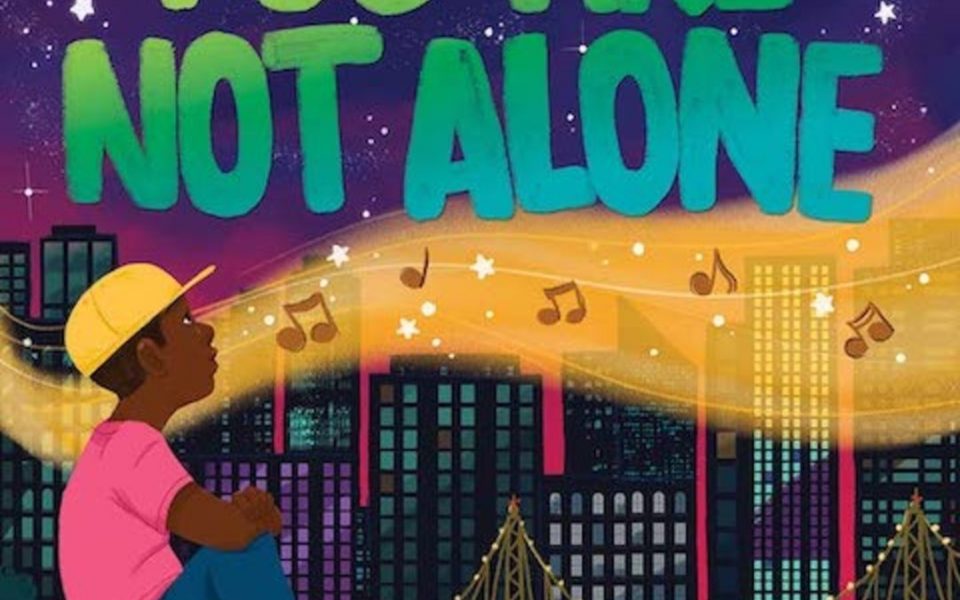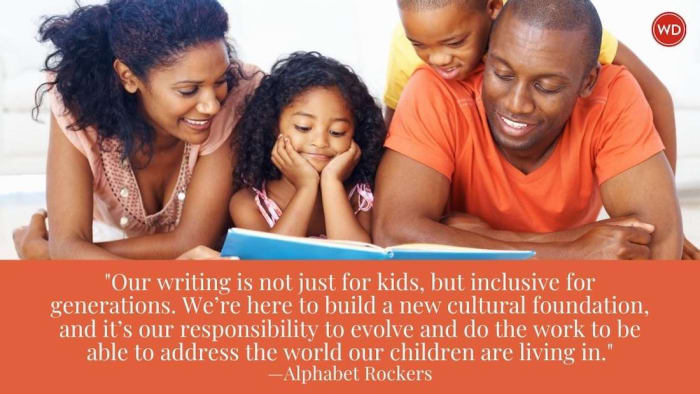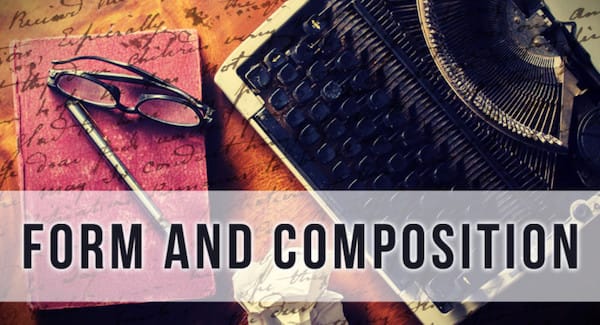How to Make Tough Topics for Adults Into Experiences for Children
Here’s the thing about tough topics: they may feel tough for you, but for someone else they are just life. In Alphabet Rockers, we write and create for children, from two Grammy-nominated albums about racial justice and gender justice to our first published picture book, You Are Not Alone, which is about empathy and inclusion.
Our work invites us all—adults and children—to create the world of belonging and equity we need. Our writing is not just for kids, but inclusive for generations. We’re here to build a new cultural foundation, and it’s our responsibility to evolve and do the work to be able to address the world our children are living in. We hold the joy of finding one’s voice and understand the challenges of feeling invisible. We amplify stories from our community and create the world of belonging we want to live in.
(How to Write About Grief for Children (and Adults) in Fiction)
Here are a few of our values and guiding principles that help us in creating experiences for children and families around tough topics.
Do the rigorous work on yourself as an adult before bringing it into your work with children.
Throughout the cultural power surge of 2020-present, writers, activists, and leaders have truly modeled and spelled out in all ways how people can “show up” for justice and equity work. Our community of writers are a huge resource to unpacking the big topics we don’t fully understand yet in our diverse lived experiences.
After reading multiple perspectives on a topic, issue, and so on, write about it for yourself. Embody your own understanding. This embodiment prepares your nervous system to feel confidence and readiness for the conversation. If you are working on a topic outside your lived experience, intentionally question what is at stake for you with the knowledge—and what it holds for you to offer your perspective on the topic to the world.
Sometimes, it might serve more to add collaborators to your writing versus inhabiting characters beyond your lived understanding.
Let questions guide the work. Then ask more questions.
Perhaps you’re on a quest to truly build a new foundation for your child (and audience) to make sense of the insensible inequalities, injustice, and power imbalances baked into our society. You want to break patterns, heal generational trauma. You want to do better. And you want your kid and child audience to know too. And your goal is to do it through the work you write and create. GREAT. Let questions be a huge part of your offering.
In writing our 2019 album, “The Love,” our guiding questions were around gender justice. “What would you say to the five-year-old you about the world you know now? What affirmations would you share?” These questions with our gender diverse community led us to songs like “I am Enough” and “I Know You See Me,” and to the hit song which was just re-released as “You Are Not Alone.” The questions baked into this song were written when a child told us they wished that friends would stand up for them for being trans, even if they were not around. We created a song intended to hold this child, and all trans kids, to a place of love, acceptance, and radical advocacy from their peers.
“I’ll be around even when you don’t see me
I’m not afraid to get teased even if it means
Standing up for you when they say those hateful things-
They’re not true, they’re not true”
What we’ve learned over the last two years as writers, particularly working as fellows of the Othering & Belonging Institute at U.C. Berkeley, is that inquiry-based work like this is called “Participant Action Research,” or “PAR.” The idea that the work we create is still in conversation with the community, and that the process of writing should be tethered to the center of the community’s thoughts, needs, and actions.
IndieBound | Bookshop | Amazon
[WD uses affiliate links.]
Ditch the narratives that do not serve our collective future.
With children’s writing, we need to look at what narratives we’re carrying from our childhood that do not serve our collective purpose and community. That in itself is hard to discern because some of our childhood lessons may have felt comfortable or protective in the moment. Investigating them looks like self-reflection, baked in love, questions, and connection beyond our own lived experience.
For example, we have to shed the narrative of protecting a child’s innocence in talking about racism and gender diversity, when our children are experiencing racist language, behaviors, and systems from childbirth. We can identify what the harm is in these systems—and we can work through it to find ways to write stories that reflect authentic love and curiosity for our collective journey for human rights. And we can do it with amazing authentic kid characters and families—not just animals.
So join us, question the old narratives, investigate what is possible, and reimagine how each word, image and story can do better.
Make a point of “getting comfortable with being uncomfortable.”
We make mistakes. Young people are conditioned to be in a constant state of learning, and adults are in a place of deciding what to learn, or even really what to unlearn. What if we put ourselves in a place that we are asking our youth to be? One where we have childlike curiosity, accept our mistakes, our stumbles, and our discomforts? In our path as co-leaders, we have made this a point for our creative workshops. It’s about creating a culture where we can actually find a new axis.
Let’s put it all together as we share the integration of this for us as co-writers in 2022, approaching the complex topics of talking about the injustices of the prison industrial complex and how it directly affects us all in our daily lives.
We knew our album would address prisons, policing, etc., but to create authentically from these HUGE issues, we needed to dive in to get to the heart. For our learning, we watched movies, read books, and dove into the experiences we were living, knowing and not knowing about, alongside the 12- and 13-year-olds in our collective. From the writing in “Punching the Air” and “Stamped” to “13th,” to essays and guidance from Angela Davis, Alicia Garza, and Mariame Kaba, there was a myriad of written and visual media to aid us. That, coupled with conversations with our community, who asked us to center transformative justice, illuminated the language, culture and ways we would create for our children.
Our inquiry process of questions included ones from the youth in our collective:
- How can we create schools that hold diverse narratives?
- What are ways people can be helped instead of locked up or punished?
- What are the ways privilege shows up in power?
- How do we open up people’s eyes to someone’s internal change?
- How can the government use the power they have to support others rather than support their own system?
And to simplify it to younger ages, we looked at power, bias, oppression, and care—roots of addressing both the systems and the individual experiences. We then asked:
- How are you powerful?
- When do you feel powerless?
As we unpacked our community’s answers, from age eight to 80, we realized we held so much power in our own circle. It connected us at a time in the pandemic where isolation and systemic racist violence was making us feel powerless. Our community voices gave us the courage to go deeper on our own work as co-writers, parents and community members. You’ll see the results and impact in our next projects as we unpack discipline, and community care.
So, what do you consider a tough topic? And are you ready to join us in doing the work? Get messy, get uncomfortable, and we’ll meet you where you are at.




